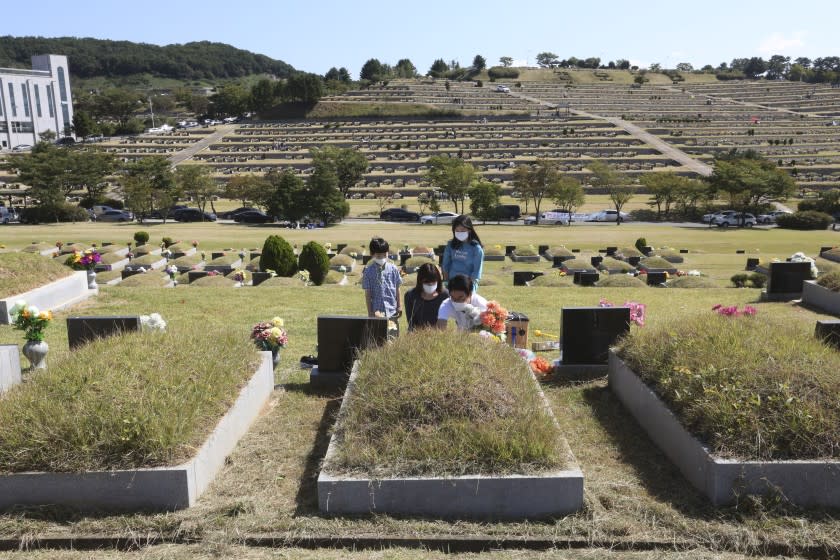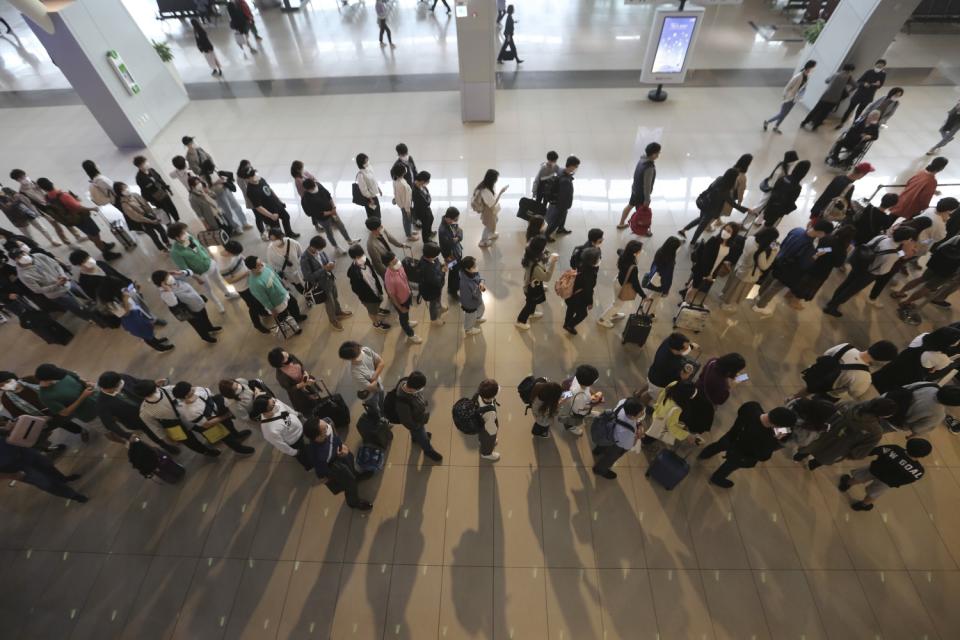Zoom, drones and virtual offerings: South Korea's ancestral rites go digital in COVID-19 times

As she has done for the last 16 years, Cho Jin-sook visited her late mother's final resting place in time for the mid-autumn harvest festival, when South Koreans pay respects to their ancestors.
She picked out sunflowers she thought her mother would like. She gently placed chopsticks on her mother's favorite food — apples — as the custom goes.
But in these strange and disquieting times, even the most hallowed of traditions play out in other dimensions. In lieu of real flowers and fruit she would have brought to her mother's grave, Cho, 56, dragged pixelated images across her computer screen, through a web browser, and mourned in a virtual world.
Having disrupted so much of the living, the COVID-19 pandemic is also altering remembrances of the dead. In South Korea, that is keenly felt during this week's Chuseok holiday, on which families gather for rites honoring the dead, visit gravesites and bow at altars lined with the season's harvest on which the ancestors' spirits are said to feast.

The 15th day of the eighth month of the lunar calendar is a major holiday akin to Thanksgiving and is celebrated across Asia, typically defined by people stuck in cars inching along highways and crowding into packed trains and buses to gather with extended family to remember the deceased.
Authorities in South Korea, out of concerns the holiday could lead to a surge in infections, have waged campaigns encouraging people to hold traditional ceremonies over Zoom or Google Meet, visit gravesites virtually through newly launched online portals and check in on the resting place of their ancestors through drone footage posted on YouTube.
Having managed to contain its local outbreak early on, South Korea nevertheless remains on edge after flare-ups in the number of coronavirus cases, especially in the densely packed capital, Seoul. The country, which reported fewer than 100 new daily cases of locally transmitted infections in the days leading up to the holiday, has been calibrating its coronavirus restrictions as it learns to return to normal life with the specter of the disease continuing to haunt.
Part of that was a weeks-long push to dramatically alter centuries-old Confucian customs of how the dead should be honored. Countries elsewhere in Asia, including Nepal and Japan, have also wrestled with new and creative ways of carrying out long-held practices many hold dear, without the health risk of travel, crowded cemeteries or large family gatherings in the midst of the pandemic.
A post shared by 연합뉴스 공식 인스타그램 (@yonhap_news) on Sep 8, 2020 at 1:59am PDT
Over the five-day holiday, South Korea announced, all public cemeteries would close or operate in a strictly limited capacity with reservations. Such unease seemed as if from another time. So much so that the provincial office of North Gyeongsang province noted on its social media account that historical texts dating to the 16th century showed rites had been canceled at the time because of disease outbreaks including smallpox.
For Yi Jun-jae, 46, this Chuseok would have marked the first year holding rites for his father, who passed away in January.
He is the eldest son of the eldest son, which in South Korea's patriarchal society gives him the responsibility to uphold traditions. Growing up, he was instilled with the importance of his roots, and the fact that he exists only because of previous generations.
Even so, when he saw that Goesan National Cemetery, where his father, Yi Kang-bup, is interred, would be closed to visits during the holiday, he thought his father would understand.
"The living shouldn't spread the virus to remember the dead," he said. "Ancestors are important, but given the circumstances, what's in the heart is what matters."
He signed up for a virtual remembrance, in which the national cemetery, where his father is buried because he fought in the Korean War, would lay a flower and pay their respects in his stead and email him photos. Yi was one of hundreds to log on to the cemetery's website to experience a new, socially distanced ritual

Yi's father was cremated, but were he in a grave, Yi could also have enlisted the services of forestry officials who will weed and trim the grass on family gravesites, another tradition for families during the mid-autumn holiday. The service, which costs $70 to $130 and previously existed for families too busy to make it to the cemetery, has also seen a surge in demand amid the pandemic compared with past years.
"I'd felt a bit distressed at the thought of being unable to visit him on Chuseok proper," said Yi, who added that he has been going to pay his respects a couple of times a month since his father died. "But it would be also shameful to go against the socially agreed government policies. I just hope the worldwide pain and chaos ends soon."
Just how widely accepted the new, virtual traditions would be are unclear. The pandemic may just have the effect of accelerating the erosion of already disappearing traditions that were deeply patriarchal and carried less and less importance to younger, more urban Koreans.
Cho said she enjoyed the virtual visit with her mother — who passed away at age 68 from a brain hemorrhage — so much that she went through it three times. She said she planned on doing it once more on a big-screen TV with her family, to be able to commemorate her mother with her son.
"It still feels obligatory to my generation to visit the grave," she said. "It felt simple and straightforward."
This story originally appeared in Los Angeles Times.

